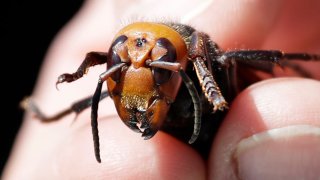
Washington State Department of Agriculture entomologist Chris Looney displays a dead Asian giant hornet, a sample sent from Japan and brought in for research, on May 7, 2020, in Blaine, Washington. – The new Asian hornets that have been found in Washington state may be murder on already stressed-out honeybees, but for humans its like a repeat of the sensationalized scare that turned Africanized killer honeybees of the 1970s: a real and nasty bug hyped into a horror movie motif that didnt quite fulfill its scary billing. Numerous bee and insect experts tell people to calm down about the so-called murder hornets, unless you are a beekeeper.
Texas A&M AgriLife experts are launching a task force, at the request of Texas Gov. Greg Abbott, to protect the state's agriculture from the so-called "murder hornet."
The Asian giant hornet was spotted several times in northwestern Washington state and Canada last year.
The hornet is known to prey on bees and can severely impact honey bee populations. Texas A&M said in a press release, "Honey bees are essential for most fruit and vegetable crop production. Because crops rely on honey bees and other insects for pollination, in its absence, crop yields would greatly suffer."
“Although this pest has not been spotted in Texas, the hornet poses a threat to both agriculture and public health,” said Patrick J. Stover, vice-chancellor of Texas A&M AgriLife, dean of the College of Agriculture and Life Sciences and director of Texas A&M AgriLife Research. “Because of this, we are bringing to bear the diverse expertise and knowledge base that exists within Texas A&M AgriLife to collaborate with federal partners and extension agents across the country to protect our state and the global food supply.”
Texas A&M said "The task force is planning several avenues of action. The team will provide science-based educational materials on the hornet for citizens and beekeepers. In addition, to guard against the hornet entering Texas, the task force will work on detection efforts for border and port-of-entry points. The team will also assist with mitigation efforts to protect Texas honey bee populations. Finally, the task force will prepare statewide identification efforts if necessary."
The task force will be made up of experts from Texas A&M AgriLife Research, Texas A&M AgriLife Extension Service, the Texas A&M Department of Entomology and the Center for Cross-Border Threat Screening and Supply Chain Defense — a Department of Homeland Security Center for Excellence with representation from various parts of The Texas A&M University System.

